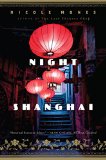Q. It seems to me that not only has Nicole Mones done a very serious research in order to write this novel, but that she actually knows Chinese, and I am curious to know if this is true. Many historical novelists use words from the language of the culture they are writing about as some kind of an exotic spice, but unlike them, N. Mones seems to have a deep knowledge of Chinese language and culture.
A. You are right; though far from fluent, I have been conversationally comfortable in Chinese for a long time. That's because I started doing business in textiles in China back in 1977, an era when very little English was spoken in the country. Despite spending a lot of time there since the 70s, and even though I had a commercial visa which gave me a surprising amount of freedom, I was totally unable to move around, see things, and communicate with people at first--because I couldn't talk! After five years of frustration, I finally went back to school at night while at home in the U.S. It took time--I was in my late thirties before I could dream in Chinese--but it was worth it. I am almost completely illiterate, and abstract conversations still lose me, but Mandarin made all the difference in understanding China. For me, language was a lens, bringing the civilization behind it into focus. Language mediates all society's thoughts and feelings and memories--it governs everything.
During the 18 years I ran my little textile business (for which I traveled back and forth regularly), I was a fly on the wall, watching China modernize, close up--and arriving as I did in the aftermath of the Cultural Revolution, I saw a lot! But it was the language that gradually made it possible for me to understand what was in front of me.
With a continuous history of almost 5,000 years, the Chinese language absolutely sparkles with metaphors and references and sayings that somehow gather in this long river of culture--making it an invaluable tool for someone like me, not just to nail cultural nuances, but to deliver fantastically picturesque curses and insults as well. What fun that was! I really enjoyed deploying the Chinese language in this book, especially choosing fixed expressions, many of which have their own legends and stories attached.
By the way, Night in Shanghai is being translated into Mandarin right now, for publication in China.



